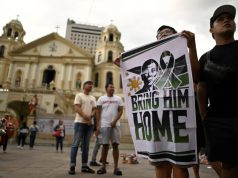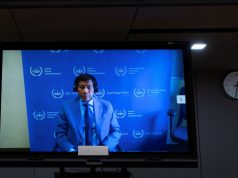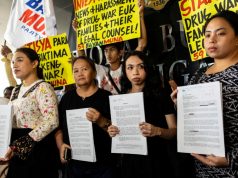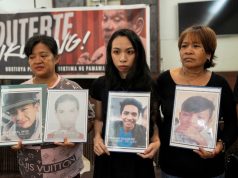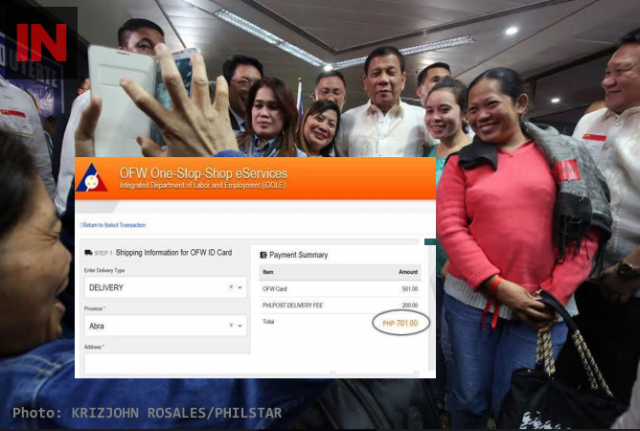
MANILA – From a dispatch ex Dubai, United Arab Emirates, a news item from Kodao Productions indicated that many Filipino expats were disappointed to discover that the OFW (overseas Filipino worker) ID, touted as Philippine President Rodrigo Duterte’s ‘best gift’ to millions of OFWs, is not actually free, as earlier announced.
Sharjah resident and Migrante Middle East coordinator Nhel Morona, who tried to acquire the ID, reported: ‘After I encoded my personal and employment details, I was asked to pay 501 pesos and another 200 pesos to have it delivered at my hometown.’
7nbsp;
Angel L. Tesorero of Khaleej Times/Kodao reported that some Filipino expats tried to apply for the OFW card by accessing the iDOLE portal <https://ofw.idole.ph/> and were surprised to discover that they will be charged with PhP 501 to obtain the card, aside from an associated delivery fee.
President Duterte led the soft launching of the OFW ID Wednesday in Manila. The ID, also called iDOLE (ID of the Department of Labor and Employment), is set to replace the OEC (overseas employment certificate), a travel document or exit pass that is required for any OFW leaving the Philippines and returning to the country of his/ her employment.
PhP501
Sharjah resident and Migrante Middle East coordinator, Nhel Morona, who tried to acquire the ID on Thursday night, told Khaleej Times: “At the onset, we already had doubts that this ID is totally free. After I encoded my personal and employment details, I was asked to pay 501 pesos and another 200 pesos to have it delivered at my hometown.”
Department of Labor Secretary Silvestre Bello III earlier announced that the OFW ID is free of cost. “All we need is to conduct an inventory of all the bona fide OFWs based on the list of the POEA (Philippine Overseas Employment Administration), in conjunction with DOLE, then we will start processing the IDs,” he said.
Bello, who described the OFW ID as the “best gift’ that President Duterte is giving to millions of OFWs for matters concerning their overseas employment,” added that “all the unique IDs will be delivered to them, whether they are in the Philippines or overseas.”
Labor undersecretary Ciriaco Lagunzad III told Khaleej Times on Wednesday that OFWs will not pay anything to get the unique card.
‘Walang babayaran’
“Walang babayaran ang OFWs (OFWs will not pay anything),” Lagunzad said in Filipino. “Recruitment agencies will pay on behalf of employers. This will be enforced by POEA. Because POEA issued a governing board resolution authorizing and imposing fees.”
“The amount will be set by POEA based on charges by three government offices – DBP Philpost and APO. Validity is term of contract but ID number is same. The ID will be updated every time there is new contract.
“The POEA will process the contract and OEC then sends to DOLE the names and other details of the processed OFW then have the ID printed by APO Printing (the same company that prints Philippine passports). Then Philpost will deliver the ID to the forwarding address of the OFW,” Lagunzad added.
“The processing of the iDOLE would be shouldered by the employers; hence, OFWs need not pay for the cost of the ID,” according to a DOLE statement.
But Dubai resident Jun Cargullo said: “The (Philippine) government earlier announced that employers or recruitment agencies will shoulder the cost of the ID. But this ID is only relevant to domestic transactions and has nothing to do with our employment abroad. This is not like the Emirates ID or UAE health card.”
More expensive than OEC
“At the end of the day, it is us, OFWs, who will have to pay for the card,” Cargullo added. “The OFW ID is actually more expensive than the OEC. We used to pay only 100 pesos to acquire an OEC every time we travel and we go back home at least once every year. So it will take at least five travels or five years before we can recoup the same expense of getting an OEC five times,” he explained.
Morona added that the cost of the OFW ID can probably be imposed on recruitment agencies which are deploying new OFWs. “But how about those who are already employed abroad? Who will pay for the OFW ID? I don’t think we can charge it to our employers,” he asked
Morona also made his own calculations. “The OFW ID will mean a windfall revenue for the (Philippine) government,” he said. “Imagine there are 10 million Filipinos working abroad, if all of us will get an OFW ID that can easily translate to 5.01 billion pesos (Dh365m).
Portal goes offline
Meanwhile, the Department of Labor and Employment has yet to issue the guidelines on how OFWs can avail of the OFW card. The iDOLE portal also went offline for few hours on Friday and then it went back live with a note that reads: “This website is for testing purposes only. To our beloved OFWs, please wait for the official launching, rest assured that the OFW card is 100 per cent free of charge to the OFW.”




